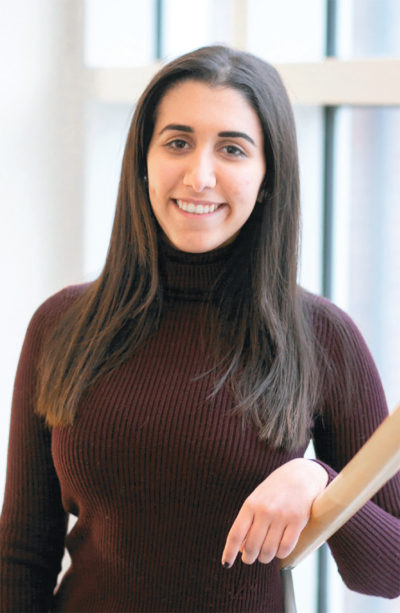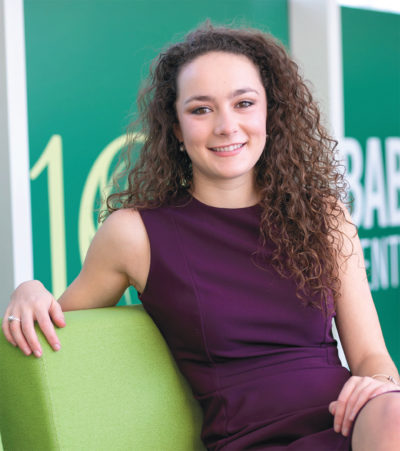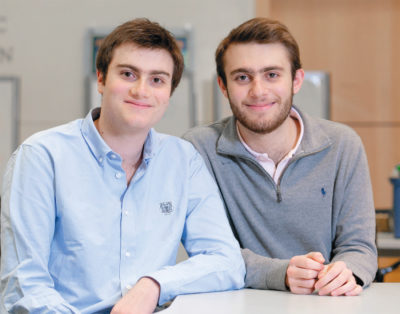
When Isidoro Katz ’21 asked his father, president and founder of the Zona K brand of restaurants in Colombia, how he viewed the future of the family business, it sparked a thought-provoking conversation.
“When I asked my dad about his prospects for the company—selling the business, joining with other businesses, selling shares, or becoming public—the first thing he asked me was if I really wanted to be part of the business,” Isidoro says.
His dad, Leo Katz, wasn’t expecting so many questions. “But,” says Isidoro, “it was also reassuring to see how much he wants us to continue with the business and work alongside him.”
Conversations like these, in which family members tackle challenging questions about the family business, underline the goal of Babson’s new Family Amplifier course, part of the College’s Institute for Family Entrepreneurship (IFE).
Started in 2018, almost 100 years after Babson opened with a founding mission to educate the next generation of family business leaders, the IFE launched to better serve the numerous students with family business backgrounds. Among Babson’s undergraduates, approximately one-half hail from families with businesses.
The institute’s latest offering is its Amplifier course, a unique program designed to prepare students for a future role in their family enterprise. Students engage with their families, asking thoughtful, investigative, and sometimes tough questions. The course offers an immersive experience to create a shared business vision that includes the next generation.
Lauri Union, executive director of the IFE, says the Amplifier embodies Babson’s philosophy of creating economic, social, and family value across generations and time. With 70 percent of the global GDP stemming from family businesses, Union believes facilitating conversations about the entrepreneurial legacy of the family is key.
“The homework involves students interviewing their parents, so it is a family experience happening while the students are in school,” she says. “While it is unique, we think it’s essential in terms of families being able to explore their values together and foster their capacity to act entrepreneurially.”
The first student cohort went through a competitive application process. Originally, organizers planned to accept 10 students for the launch, but with 50 compelling submissions from students all around the world, they expanded to 20. Families had to be engaged in an entrepreneurial venture such as a business, a family office, or an investment platform.
The initial group included many international students with family businesses ranging in size from two to 60,000 employees. Some students have worked with their family business in the past, and some haven’t been as directly involved, but all are eager to explore the dynamics of family entrepreneurship with each other and their relatives.
The program includes twice-monthly classes where students discuss family business concepts, engage with guest speakers, and learn about each other’s operations. The homework—exploring the business’s history and potential and talking to involved family members—is what sets the class apart. The process has been eye opening for students.

Through the Amplifier program course, Nicole Atala Asfura ’19 connected with her family in a new way.
Fostering Family Dialogue
Nicole Atala Asfura ’19 entered new territory by having these kinds of conversations with her family, which owns a third-generation, Honduras-based financial business, one of the biggest enterprises in the nation and Central America. Helmed by Atala’s father and his four brothers, Grupo Financiero Ficohsa operates in four countries and has several U.S. branches.
Atala, who will graduate in May with a double concentration in strategic management and entrepreneurship, says she was drawn to the Amplifier course. She knew family members’ roles in the business needed further discussion.
“I saw the Amplifier program as an opportunity to provide support on what our goals should be,” she says of the fast-growing company, “and an opportunity to experience this with the insights of other families, alumni, and resources connected to the program.”
Atala admits she found the required discussions with her father and uncle challenging at first, as the men offered only one-word answers without much elaboration. But once she pressed for specifics, she connected with them about the business in a different way. She’s excited to gain knowledge on operations, future projects, and their five-year plan.
Her father, Luis Alberto Atala Faraj, also knew it was important for the family to be in sync on issues of entrepreneurship. He says he benefited by connecting more with his daughter and hearing her point of view. “It makes us reflect on aspects of the family business we need to think more about.”
Strengthening Bonds
Elizabeth Reed ’19 grew up working as part of the third generation of her family business, Storee Construction, an industrial construction company that her mother and two uncles own in Missouri. Under the guidance of her mother, Reed worked in almost every department of the business, including accounting, purchasing, human resources, and project and safety management.

Through conversations with her mother, Elizabeth Reed ’19 knows she’ll be able to shape her role in the future of the family business.
Reed came to Babson to pursue her interest in business as a Center for Women’s Entrepreneurial Leadership Scholar and member of the women’s varsity soccer team. As a senior, Reed was thrilled to be one of the 20 students in the pilot Amplifier course, and she appreciated the chance to have her mother, Amanda Reed, directly involved in her schoolwork and education.
One of the first class projects focused on goals and leadership, and Reed asked several members of her family to create and prioritize a list of life and business goals.
The conversation with her mother included guided questions around her mother’s vision for the company, “her vision of me as her daughter, and the opportunities to be involved in the continued growth of the company as a part of the family business’s third generation,” Reed says.
“Together, we explored the goals my mother had as a business owner and the value she saw in utilizing the capabilities and interests I’ve developed both inside the company and outside, while pursing my management consulting career.”
These conversations also gave Reed the confidence that her family will give her an opportunity to help shape how she is involved in the future of the business.
“Through the Amplifier course, Elizabeth also gained insight into navigating the power dynamics that are inherent to all family businesses,” Amanda Reed says.
Elizabeth Reed always intended to stay involved with the family business, but says the Amplifier course helped her build a more concrete plan for the future. Throughout her four years at Babson that involvement has ramped up; she’s focused on systems integration to help create a new competitive edge for Storee’s project management.
Focusing on Family Interaction
Matt Allen, faculty advisor to the IFE and academic director of the global Successful Transgenerational Entrepreneurship Practices Project at Babson, says he created the Amplifier course based on his experience teaching other family entrepreneurship classes, and worked with other Babson faculty to develop the class. The program will launch in the graduate school this fall.
“According to family theory, relationships and interaction between family members play a key role in how families understand themselves and each other,” Allen says. “More importantly, the quality of interactions can define the ability of families to work together. In typical business education, the family is ignored. Instead, emphasis is placed on content such as operations, finance and marketing—but this content does not prepare students to actually function effectively within the family.”
Students, he adds, are often transitioning from a traditional parent-child relationship into one that will eventually become more professional. “As students study away from home and the family, the relationship does not mature as quickly as the students themselves. The family is learning to readjust and come to a new balance of understanding based on new roles in the family and the business. Thus, the name of the course; we are amplifying the family’s ability to build and grow entrepreneurially.”
The class will eventually cover three years of the undergraduate experience, with the current course, focused on enhancing family relationships, offered to sophomores. As juniors, students will concentrate on improving their understanding of the business and work with their family to discover entrepreneurial opportunities. As seniors, students will work directly with their families to fulfill one of the opportunities defined during their junior year.

Twins Isidoro (left) and Jonathan Katz ’21 discovered how much their father wanted them to work in the family’s business in Bogota.
Continuing on the Amplifier Journey
Isidoro Katz will continue on the Amplifier path as it evolves. He was born into his Bogota, Colombia, family business, comprised of more than 20 restaurants and food purveyors, mostly under the Zona K brand. Katz’s sister, Michelle, graduated from Babson in 2017, and twin brother Jonathan is currently in the Amplifier program with him.
He appreciates connections he made in the classroom: “I really liked how we could connect with other students and learn what they are doing, how they are similar or different, and what they value the most.”
Before he started the Amplifier course, Katz didn’t know if he wanted to return to Bogota and join the family business immediately after graduation, or follow in his older sister’s footsteps and take some time to work in the U.S. He’s still unsure of his path, but knows he will ultimately work in his family business.
Whatever Katz decides, this course will help him reach his goals by amplifying conversations for the next generation of family entrepreneurs.
Paige Wolf is a freelance writer in Philadelphia.
